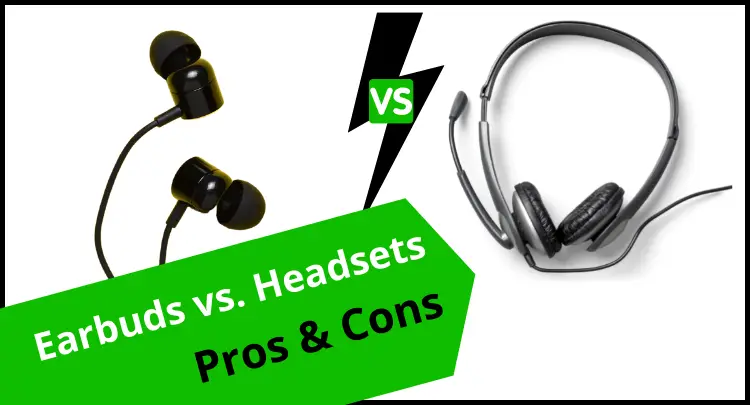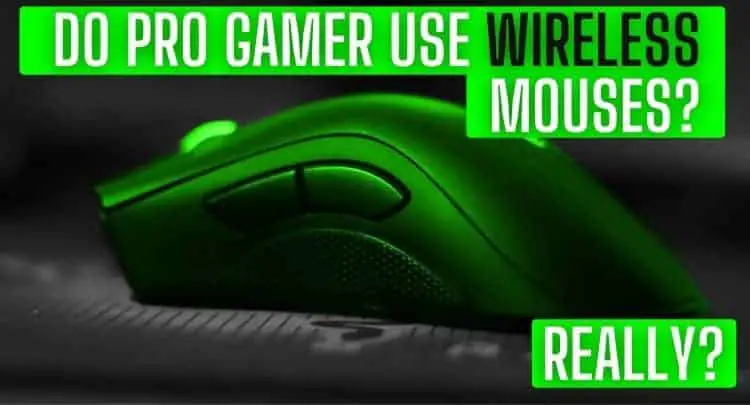In this post, we banish all cables and take a look at wireless headsets. More specifically, we’re talking about wireless gaming headsets that have established themselves on the market in recent years. So naturally, gamers always ask themselves whether it makes sense to use these headsets for gaming.
Wireless headsets have two significant disadvantages that are taboo for pro gamers. However, for casual gamers, wireless headsets are a practical alternative. Only under optimal conditions is there no difference between wireless and wired headsets when gaming.
More and more wireless devices are conquering the market. In gaming, players can now choose from countless wireless input and output devices such as headsets. So every gamer will ask himself the question at some point: Are wireless headsets better or at least equal to cable headsets, or are there critical disadvantages?
Note: This article was written in English. Translations into other languages may not provide the same linguistic quality. We apologize for grammatical and semantic errors.
Short Introduction Wireless Headsets and Gaming
With the first stable Bluetooth standards in 2002/2003, the first wireless headsets for end-users were launched. However, with transfer rates of less than 1 MBit/s and interference-prone connections to the PC, this new generation of peripherals quickly had a bad reputation among gamers.
Just a decade later, the technology was much more mature. Twenty-five times faster, stable connections over 30 feet, and more energy-efficient use made wireless headsets enjoyable for more and more people.
Are gamers among those people?
No.
There have always been, and still are, good reasons why gamers scorn wireless headsets and why they continue to use wired devices.
In any case, one reason is eliminated – the type of connection.
Honest recommendation: You have the skill, but your mouse doesn't support your aiming perfectly? Never struggle with your mouse grip again. Masakari and most pros rely on the Logitech G Pro X Superlight. See for yourself with this honest review written by Masakari or check out the technical details on Amazon right now. A gaming mouse that fits you makes a significant difference!
Bluetooth or Wi-Fi – Which Connection Type Do Wireless Headsets Use?
It could be that gamers have something against Bluetooth and therefore reject wireless headsets. With very few exceptions, wireless headsets use Bluetooth as a connection protocol.
However, this thesis can be confidently rejected. Firstly, gamers now also use other Bluetooth devices, such as wireless mice. Secondly, Bluetooth extends the battery life enormously in direct comparison to Wi-Fi. Finally, Bluetooth requires much less power and is rightly the standard for a peripheral device with a battery.
Wi-Fi protocols are designed for very stable data traffic but not specifically for audio signals. As a result, Wi-Fi is qualitatively weaker in the audio range than Bluetooth.
So let’s now look at the crucial factors.
3 Advantages of a Wireless Headset
The three advantages are apparent – as with all wireless technologies. I know that this is not so exciting for you, but we don’t want to let them get under the table. The seven disadvantages come in the next section. So for the sake of completeness, here are the advantages. 😉
1. Optics
Cables twist—cables knot. Cables are always in the way. Besides, a wireless device looks “cleaner” in design—a clear plus point for wireless headsets.
2. Freedom of Movement
Just get up and get a coffee. With a regular headset, that means putting the headset down somewhere first.
Once the coffee has been fetched, it’s the other way around – grab the headset and put it on.
For such cases, a wireless headset has clear advantages. Even at a distance of a few feet, you can still talk to friends in voice chat. Depending on the range, you can even get to the kitchen and back.
3. No Cable Tangle
Maybe you change the headset from PC to console more often. Unplugging, replugging, finding the jack, and laying the cable takes time. Or meet up at small LAN parties with friends. The wired headset has – like any wired device – the natural ability to connect to other cables.
Fascinating stupid feature, right?
So you have a cabled mouse, a network cable, etc., in your bag, then you are looking forward to the cable tangle at your destination.
With a Wireless Headset, you don´t know what I´m talking about.
7 Disadvantages of a Wireless Headset
I can think of 7 disadvantages spontaneously.
1. Battery
The battery technologies are getting better and better. On standby, the batteries of wireless headsets last a very long time. Frequent charging is, therefore, not necessary.
Unless you use it ;o)
Absurd, right?
If a wireless headset is used for several hours, the battery level drops rapidly. Daily recharging is then mandatory. We know this from cell phones – it’s annoying!
Besides, the batteries are usually permanently in use. So nobody can charge or discharge a battery optimally, i.e., the battery can no longer be fully charged at some point (usually just outside the warranty period). Frustrating.
Nowadays, energy balance is also essential – The keyword here is “environmental protection.” Batteries are manufactured using toxins and energy. At the end of their life cycle, you cannot wholly recycle them. For the environmentally-conscious gamer, certainly a decision criterion.
2. Latencies and Audio Quality
Wired headphones have a natural latency of 5-10 ms. With ordinary wireless headsets, the latency increases to 50-200ms, even with the latest Bluetooth 5.0 standard.
What may be okay for regular use, such as voice chat or listening to music, is a no-go for gamers. If you hear your opponent 100 ms later, you are dead or at least have a considerable disadvantage.
There is currently an unusual and rare Bluetooth codec (aptX LL) available for wireless gaming headsets, but it still generates latencies of 30-40ms.
These numbers are very daunting for gamers, although we are talking about a delay that is three times less than the blink of an eye (100 ms).
However, with the high latencies, a second negative factor also comes into play – poorer audio quality. A stronger compression of the signals achieves lower latencies. Compression, however, leads to a loss of audio quality in this case.
With Bluetooth 5.0, new codecs have been introduced whose improved compression leads to much less audio quality loss. Nevertheless, wireless headsets do not come close to the current standard of wired headsets.
3. Weight
Wireless headsets weigh 1 to 3.5 oz more than their wired counterparts. Is that really relevant and a disadvantage? I’m not an orthopedic surgeon, but every extra gram on the head is unnatural and strains the neck and neck muscles. This could have a negative effect while gaming in very long sessions.
4. Maximum Sound Quality and Bitrates
Let’s look at the fastest wireless codec (AptX LL) in terms of maximum bitrate. We can see that the codec/driver is limited to 44.1 kHz by the Windows operating system.
However, the audio range of games covers sounds up to 48 kHz.
This Bluetooth codec for gamers lives here, thus with a trade-off – low latency was bought with a restriction of the sound quality.
Of course, there are codecs with better sound quality, but this means less compression, which produces higher latencies.
A dilemma that wired headsets do not know.
5. Price
Wireless headsets are more expensive than comparable wired headsets. Comparing wired and wireless versions of a headset show that manufacturers double the wireless device’s price. However, I cannot judge whether this is justified by the technology used (transmitter, receiver, etc.).
6. Durability
It has happened to all of us before: The headset slips off the head or lies on the table and slides down. But, with a wireless headset, there is only one result: impact on the floor.
A wired headset still has a chance to get caught with the cable at a safe height.
You may smile now, but I have experienced such a crash much more often than I would like. It can go well, but it can also mean that components inside are damaged, loose contacts occur, or the headset immediately stops working. Sometimes the cable is something like free insurance.
7. Misplacement
Who does not know it? Before leaving your own four walls, the key has suddenly disappeared.
Now the search in a panic begins.
With a wireless headset, such a thing could theoretically happen to you. Admittedly, the chance is small, but it is just as annoying as searching for the key if you misplace the headset.
Conclusion
I will buy two headsets – one regular and one wireless. Why?
For casual gaming on the couch or console, a wireless headset is, of course, much more comfortable. If you only gamble a few hours a day or a week, most of the disadvantages (as long as you have the necessary change) don’t matter.
The exception is if you use the headset for hobbies besides gaming, which requires the best sound quality. If you are a DJ, composer, or similar, you will, of course, not cut back on the bitrate.
The wired headset would always be my first choice when it comes to competitive gaming. Here, real-time audio signals with high sound quality are critical and decide on victory or defeat.
If you use a headset for more than 8 hours a day, you cannot afford the risk of a dead battery.
Have you ever wondered why pro gamers always wear two headphones on top of each other at events? Here’s the answer.
If you have a question about the post or pro gaming in general, write to us: contact@raiseyourskillz.com.
If you want to get more exciting information about becoming a pro gamer and what relates to pro gaming, subscribe to our newsletter here.
GL & HF! Flashback out.




